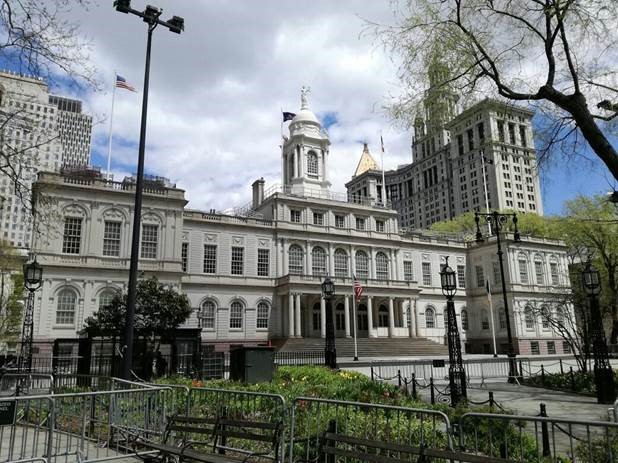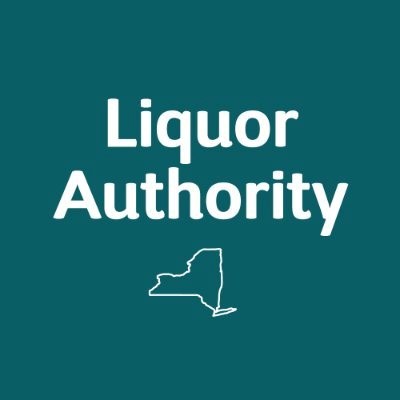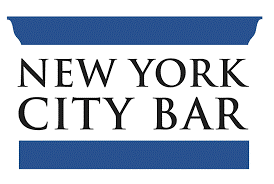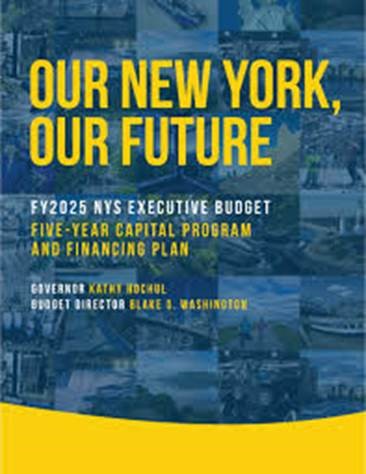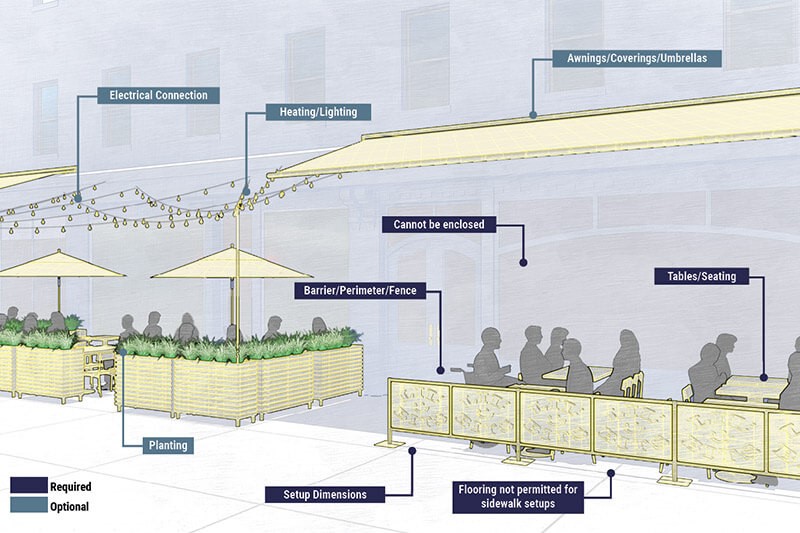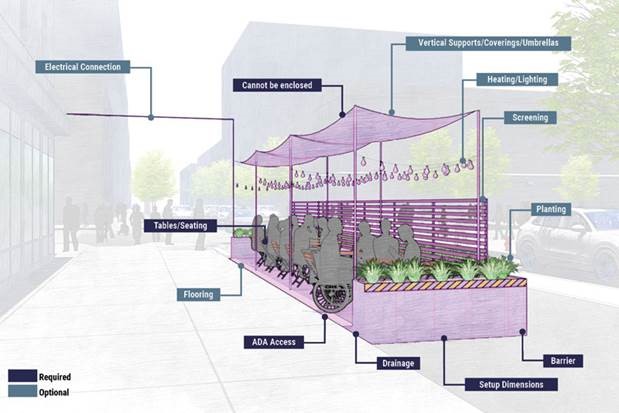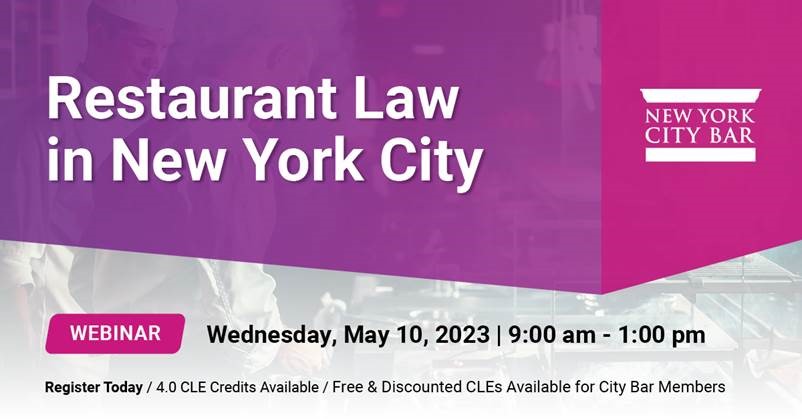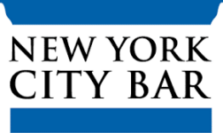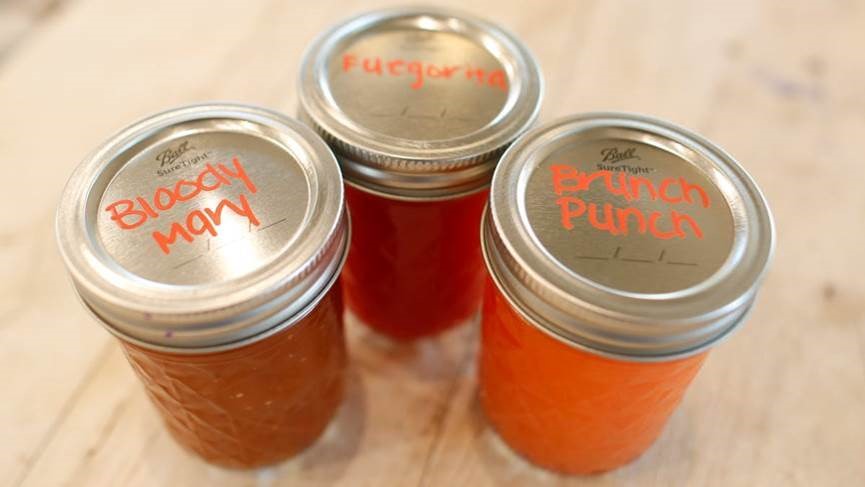Mayor Eric Adams signed into law the controversial Safe Hotels Act, claimed by its sponsors to be a historic step towards enhancing public safety and ensuring worker protection in the city’s hotel and hospitality industry. The legislation requires hotels to obtain a license to operate in New York City and implements enhanced security and safety measures such as panic buttons for housekeepers, human trafficking recognition training, and subcontracting and employment restrictions for critical, public-facing hotel staff. While the legislation received support form numerous hotel and trade unions, groups supporting hotel owners claimed that it would kill jobs, burden the industry and throw it into turmoil by, among other things, leading to skyrocketing room rates. Smaller hotels are exempt from the legislation. The bill passed with overwhelming support by the City Council.
A long awaited amendment to the laws on temporary retail permits was signed by Governor Hochul on Wednesday. The prior law only permitted temporary retail liquor permits on new applications in New York City if the premises had been licensed within the past two years. The new law, passed by the legislature in June and awaiting the governor’s signature, eliminated the two year requirement. Now, any applicant for an on premises license can apply for a temporary permit, even if the space was never previously licensed. Approval of the temporary permit, however, is conditioned upon the New York State Liquor Authority making a preliminary finding, after the 500 foot law hearing, that the public interest test has been met. An applicant operating under a temporary permit on a new application must close by midnight, and is not permitted to have a DJ or live music. This is a hugely significant change in the law, especially given how long it takes for final approval of liquor license applications.
On May 15, 2024, the New York City Bar Association will present a webinar on Restaurant Law from 9:00 am until 1:00 pm sponsored by the Hospitality Law Committee. The program will focus on the corporate, real estate, liquor license, and employment/labor issues in opening and operating a restaurant. Donald Bernstein of Bernstein Redo & Savitsky, P.C. will present a one-hour section on retail liquor licenses in New York, including reviewing who can be licensed, what can be licensed, the 200 foot and 500 foot laws, and how to navigate the New York State Liquor Authority and the local community boards. He will also discuss the ever popular private members club and the rules in New York that govern the licensing of private members clubs.
There are significant changes in the liquor laws included in the state budget for 2025 signed by Governor Hochul. One of the provisions eliminates the 30-day waiting period to file an on-premises license application with the New York State Liquor Authority after notice is given to the local community board or municipality. Applications can now be filed simultaneously with the giving of that notice.
In 2022, legislation was enacted allowing cocktails to go. The sunset of that law has been extended from 2025 to 2030.
The 2025 budget also allows the licensing of movie theaters for full liquor. The prior law only permitted movie theatres to serve liquor if it met the definition of a restaurant. Under the new law, snacks such as popcorn and candy are sufficient for movie theaters to meet the food requirement for a license.
Changes were also made regarding one-day caterer’s permits. Prior law required any permit for full liquor to be limited to indoor or tented outdoor spaces. The new law now allows private event permits to be issued for outdoor events.
Another change eliminates the Prohibition-era requirement that a liquor, wine, or package store be located at street level to qualify for a license.
One proposed law that did not make it into the budget was intended to eliminate the requirement that a premises had to have been licensed within the prior two year period for a new license in the City of New York to obtain a temporary permit.
In accordance with Local Law No. 121 of 2023, the New York City Department of Transportation released its final rules relating to its Dining Out NYC Program for permanent sidewalk and street seating. As of today, March 5, 2024, DOT opened its portal to accept applications under those rules. These rules replace the 2020 temporary Open Restaurants program, and all restaurants that have permits under the COVID-era program are required to file with DOT for new permits by no later than August 3, 2024. All new applicants who have ground floor interior space are eligible and may file an application with DOT. The application must include a petition which is available on the DOT website, a site plan showing all required clearances, photographs, property owner consent and certification from the applicant that they have entered into a contract for pest control for the outdoor area. Applicants must also have a Health Department permit. Once DOT receives an application, notice is given to the local community board which has the right to comment. If they oppose the application, DOT will conduct a public hearing. Unenclosed sidewalk and roadway cafes may only operate until midnight, and alcohol may be served only if permitted by the New York State Liquor Authority. No music or smoking is permitted in the outdoor space. Roadway cafes must be dismantled between November 30th and March 31st. Sidewalk cafes must have a perimeter demarcation, such as a base wall, planter, fence, or stanchions with ropes. It may not be erected on any platform or flooring. The code has specific required measurements and clearances to curbs, tree beds, subway grates, fire hydrants, and other objects. DOT estimates that approval times for applications will be approximately six months.
In August, New York City Mayor Adams signed a bill to create a permanent outdoor dining program, called “Dining Out- NYC,” which grants the Department of Transportation authority to issue permanent licenses for roadbed and municipal sidewalk seating. DOT just issued proposed rules for the Dining Out-NYC program with notice of a public hearing to review those rules before they are adopted. Here is a copy of those proposed rules: DOT Outdoor Dining Proposed Rules.pdf (nyc.gov)
DOT will be conducting a public hearing on the proposed rules online on November 20, 2023 at 10:00 am. Participants can join the Zoom meeting via the link above. Written comments can also be submitted to rules@dot.nyc.gov. Anyone wishing to speak at the meeting must register to do so by November 17th. Once final rules are enacted, DOT will launch an online application portal and applications will be accepted in early 2024. Operators who have temporary permits under the Open Restaurants program may continue to use those permits through the remainder of 2023, and then must apply under the new program within three months.
Bernstein Redo & Savitsky, P.C. senior partner, Donald M. Bernstein will be participating in a panel webinar at the Bar Association of the City of New York on Wednesday, May 10, 2023, from 9:00 am to 1:00 pm. The webinar will include presentations by various speakers and discussions on restaurant leases, retail liquor licenses, labor/employment law, and corporate issues. It is being sponsored by the Bar Association’s Hospitality Committee, of which Mr. Bernstein is a member. Registration is available on the Bar Association website.
On August 31, 2022, the New York State Liquor Authority adopted a number of advisories that change licensing requirements. The intent of these changes is to remove requirements that are deemed unnecessary, and to help streamline the application process. The advisories are all posted on the SLA website. Some of the more significant changes are as follows:
1. An applicant is no longer required to provide the SLA with a certificate of occupancy, temporary certificate of occupancy, letter of no objection, or place of assembly permit for the premises to be licensed. This change, however, does not affect the requirements of the municipality with respect to the need for certificates of occupancy or place of assembly permits.
2. An applicant that is a corporation or limited liability company need only disclose those direct or indirect owners with an interest of 10% or more. Any owners, members, or investors with less than 10% do not have to be disclosed. This is a significant change. The prior rules required all owners and investors to be disclosed and complete personal questionnaire forms, regardless of their percentage ownership, if there were 10 or fewer owners. The 10% threshold only applied if there were more than 10 direct or indirect owners. Directors of a corporation do not have to be disclosed, and the only officers required to be included in the application are president, secretary, treasurer, and CEO if there is one.
3. Applicants will no longer be required to provide copies of bank statements showing the source of funds. The SLA does, however, reserve the right to request such documentation during the review process.
4. The SLA will no longer scrutinize deeds or leases, other than confirming the name of the applicant, the premises, and whether there is a percentage rent provision.
5. Outdoor space on private property must be a part of the application if it is to be licensed and must be contiguous to the indoor space. Municipal space is not to be included in the application as part of the licensed space. The applicant must, however, have a permit from the municipality to use that space. It does not have to be contiguous to the indoor space. Any licensee that has a condition on its license prohibiting the use of outdoor space may no add that space unless it has an application for a change in method of operation filed and approved.
6. Importer Licensees are now permitted to use Marketing Permits. Additional restrictions have been placed on the use of Marketing Permits in unlicensed spaces – upper tier entities may use Marketing Permits in unlicensed spaces (i) a maximum of times at a given unlicensed location per year, (ii) on no more than two consecutive days at any unlicensed location, and (iii) on no more than two consecutive weekends at any unlicensed location.
Please contact us if you have any questions regarding these important changes.
The New York City Bar Association is hosting a program, “Opening a Restaurant in New York City: Legal Issue Bootcamp,” on Thursday, June 1, 2022 from 9:00 am until 1:00 pm. Donald Bernstein of Bernstein Redo & Savitsky, P.C. will be one of four presenters/panelists, and will be speaking on the subject of New York liquor licenses. Other topics will include corporate formation, restaurant leases, and labor and employment issues affecting restaurants. The program is sponsored by the Hospitality Committee of the Bar Association.
Last week, New York State amended the Alcoholic Beverage Control Law to allow for cocktails to go. Under the new law, any retail licensee may sell any product it sells at retail for take-out or delivery. Liquor or wine to go must be accompanied by a “substantial food item.” The alcoholic beverage must be packaged in a container with a secure lid or cap sealed in a manner designed to prevent consumption without removal of the lid or cap by breaking the seal. Take out and delivery may only occur during the licensee’ permitted hours of operation. The price for the to go drink must be the same as if it was consumed on the premises. No bottles of wine or liquor may be sold to go. Delivery must be to a residential address and to a person 21 years of age or older as shown by legally acceptable ID. In furtherance of this new law, the New York State Liquor Authority issued a new Advisory effective today, “Guidance on Sale of Wine and Liquor to Go by On Premises Retail Licensees.” That Advisory defines what the new law means by “substantial food item,” which is “sandwiches, soups or other foods, whether fresh, processed, precooked or frozen.” Wings, salads and hot dogs are also sufficient. The Advisory states, however, that a bag of chips, bowl of nuts, or candy alone are not sufficient. The Advisory also warns that an “unreasonably small portion of soup, a serving of canned beans, a handful of lettuce, or charging a small extra fee for an alcoholic beverage in lieu of a food item not actually ordered or delivered will be treated as a violation of the law.” The Advisory also reiterated that bottles of liquor or wine remain prohibited. Obvious efforts to circumvent that law, such as transferring the contents of a bottle to the same or equivalent bottle will be treated as a violation of the law. The new statute also states that open carry laws are not changed. The SLA Advisory can be viewed here:
https://sla.ny.gov/system/files/documents/2022/04/advisory_2022-2_-_sale_of_wine_and_liquor_to-go_by_on_premises_retail_licensees.pdf

